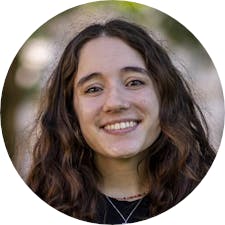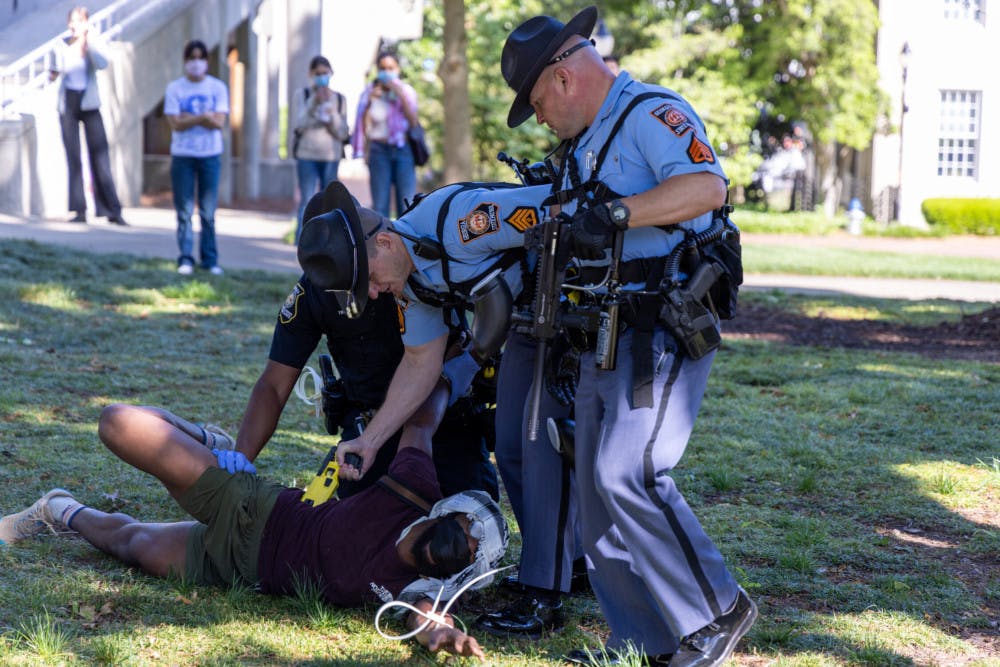A young woman cried into a cell phone camera as a police officer dragged her off of Emory University’s Quadrangle around 10:15 a.m. this morning, stating her birthday and her mother’s phone number. Ten minutes later, a young man yelled as another officer walked him off the Quad in handcuffs, shouting that the restraints were too tight and were cutting off his circulation. The officer looped an arm under the protestor’s leg and lifted him, carrying him away as the protestor yelled for help.
The two individuals were among several protestors detained during a demonstration this morning. Protestors gathered on the Quad at 7:30 a.m., erecting around 20 tents in an “encampment for Gaza.” They listened as demonstrators took turns stepping to the front of the group to share speeches through a megaphone, cheering for each other as they declared support for Gaza in the Israel-Palestine conflict.
Within three hours, Georgia State Patrol, Atlanta Police Department (APD) and Emory Police Department (EPD) officers walked along the sidewalk before turning onto the Quad and closing in on the protestors.
Screams broke out as the protestors attempted to run away and officers began tackling some of the individuals. Less than a minute after the altercation began, officers released irritant gas on the protestors. Officers tased at least one of the protestors.
An officer outside of the Administration Building told detained protesters they were being taken to DeKalb County Jail. Multiple members of police declined to confirm this information to Emory Wheel reporters.
Police officers had gas masks and used non-lethal ammunition. Officers also tackled protestors and used zip ties to arrest individuals on the Quad.

In an email to the Emory community addressing the situation at 11:10 a.m., University President Gregory Fenves wrote that several dozen individuals who are “largely not affiliated” with the University “entered” campus for the protest, “disrupting” the Emory community amid final exams. Fenves called this disruption “completely unacceptable.”
Fenves added that EPD told the individuals they were trespassing, and law enforcement “cleared” the area after the protestors “refused to leave.”
“I ask each of you to use judgment and show compassion for everyone with whom you share this community,” Fenves wrote. “It is essential that we preserve an atmosphere of respect on our campuses at all times.”
When Pamela Scully, Samuel Candler Dobbs professor of women's, gender and sexuality studies and professor of African studies, received the email, she said it felt like “the classic kind of statement that comes when people are trying to control protests.”
“There were numerous students here today,” Scully said. “It wasn’t outside agitation.”
Vice President of University Communications Laura Diamond echoed Fenves’ message, writing that “these individuals are not members of our community.”
“They are activists attempting to disrupt our university as our students finish classes and prepare for finals,” Diamond wrote. “Emory does not tolerate vandalism or other criminal activity on campus. The Emory Police Department ordered the group to leave and contacted Atlanta Police for assistance.”
Around 11:35 a.m., APD officers loaded the detained individuals into their department’s prisoner transport vans, prompting protestors to chant outside the Administration Building while facing a row of police officers, yelling “Fenves, Fenves, you’re a liar” and “We demand a ceasefire.” The vans left campus at 11:37 a.m. and 11:48 a.m.
The protestors marched to Convocation Hall soon after the second van left. A young woman stood on the steps before at least a hundred protesters, leading chants such as “Fenves, stop the slaughter.”
Scully joined the students on the Hall’s steps, telling the crowd that she is “deeply ashamed” of the Emory administration’s response.
In an interview with the Wheel after she addressed the crowd, Scully said she felt it was important to be present at the protest because of the demonstrations at other universities, such as Columbia University (N.Y.), the University of Southern California and the University of Texas at Austin, where police officers mass arrested Pro-Palestinian protesters. Columbia’s “Gaza Solidarity Encampment” is entering its eighth day of protest today.
“It’s really important if the University is not going to stand up for academic freedom, it’s essential that faculty do so,” Scully said.
The Georgia chapter of the Council on American-Islamic Relations (CAIR-Georgia) released a statement shortly after the protest was terminated, condemning the police for using tasers and irritant gas to break up the pro-Palestine demonstration. The Wheel was unable to speak with officers to confirm if the gas used was tear gas.
CAIR-Georgia filed a federal civil rights complaint with the U.S. Department of Education’s Office for Civil Rights on behalf of Emory Students for Justice in Palestine on April 5. The complaint stated that students have been subject to anti-Palestinian, anti-Arab and Islamophobic harassment at Emory.
“Protesters shared a day of cultural learning and community despite which Emory deployed excessive use of force, tear gas, and rubber bullets,” CAIR-Georgia wrote. “Emory University and APD fully bear responsibility for the violence we are seeing at the Emory campus right now. Students and protesters must be allowed their full constitutional rights.”
Candler School of Theology Senior Research Fellow Tara Doyle was among the individuals afflicted by the gas. She recalled that the police directly pointed “lots” of the substance at protestors’ feet without warning. Students had to carry Doyle out of the area.
“I was just starting to stumble,” Doyle said as other people hit by the gas coughed nearby. “These lovely young students said, ‘Ma'am, what do you need?’ And I said, ‘What I need is some stability in the middle of this madness.’”
Eduardo Moeller (26L), who arrived at the Quad after police terminated the protest, noted that the demonstrations across U.S. college campuses may have fueled the decision to detain the protestors.
Associate Professor of Religion Ellen Gough said that one of her students alerted her of the protest. The police later detained that student, Gough said, calling the University’s behavior “inappropriate and unacceptable.”
“There were about … 35 peaceful protesters drinking coffee, eating snacks, chanting on the lawn,” Gough said. “They were absolutely non-violent. This is an institution of learning and dialogue. That’s exactly what they were participating in.”
Gough, who joined Emory’s faculty in 2015, said she has never seen anything like this before on campus.
“It’s terrifying,” Gough said. “I was with a group of students where we’re supposed to go into class at the Carlos Museum. We’re standing outside the museum and they witnessed this trauma. We thought we heard gunshots and they have to live with that — the students.”
A faculty member who requested to remain anonymous out of fear of retaliation said the police response was “horrifying and shameful.”
“I’m not proud to work for Emory today,” the faculty member said as they walked away.
This protest comes exactly one year after EPD shut down a student-led demonstration on the Quad on April 25, 2023. Gathered with tents on the same side of the Quad as today, students were protesting the construction of the Atlanta Public Safety Training Center before they were told to leave or face arrest.
Associate Professor of Philosophy Dilek Huseyinzadegan said that faculty, staff and students “begged” Emory to not bring police to campus for today’s protest.
“It’s embarrassing,” Huseyinzadegan said. “I don’t want to live on a campus police state. You brought Cop City to campus. Thank you so much, Emory."
Correction (4/25/2024 at 3:46 p.m.): A previous version of this article stated that Pamela Scully is a Samuel Candler Dobbs professor of women's, gender and sexuality studies and professor of African American history. In fact, Scully is a Samuel Candler Dobbs professor of women's, gender and sexuality studies and professor of African studies.

Madi Olivier (she/her) (25C) is from Highland Village, Texas, and is majoring in psychology and minoring in rhetoric, writing and information design. Outside of the Wheel, she is involved in psychology research, the Emory Brain Exercise Initiative and the Trevor Project. In her free time, you can find her trying not to fall while bouldering and obsessively listening to Hozier with her cat.

Spencer Friedland (26C) is from Long Island, N.Y. While not working at the Wheel, he is a member of Emory Disability Rights, Education Activism and Mentoring and the Franklin Fellows program. In his free time, he can be found watching the New York Yankees or going to the movies.









